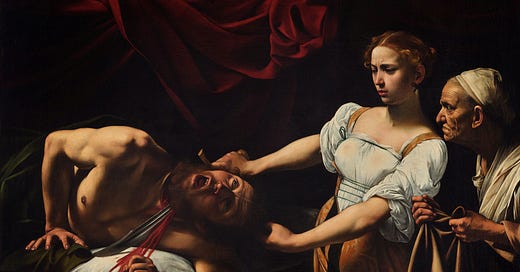In the face of violence, it is tempting for observers to demonize its perpetrators and sanctify its victims. This impulse is very often well-meaning, born in counterweight to loathsome, oppressive behavior. It is also a grave mistake. Perpetrator and victim, oppressor and oppressed—these are contextual roles, not durable identities. To permanently assign them is to systematically lower or raise a person or group. That is: to dehumanize them. And dehumanization is the lynchpin of the most gruesome atrocities in the first place.
I see the conflation of role and identity everywhere I look these days. In my job at a large management consultancy, there is confusion amidst organizational change between specific task ownership and secure employment—the irony being role flexibility actually tends to enhance job security. As a novelist, I see a literary landscape full of Manichean no-choice plots and propagandistic social agendas, polluting the artistic pursuits of beauty and truth with transparent real-world virtue signaling. And on the news, on social media, I see the weaponization of past oppression to seize power, to justify retaliative actions of the very kinds “never again” and “never forget” were supposed to protect us against. I see swastikas flash in the name of anti-colonialism and basic humanitarianism branded anti-Semitic—not to mention hostages and dead children—a positional arms race of horror that relies on polarization and “sides,” on words like senseless and unfathomable.
The cognitive challenge in witnessing apartheid and terrorism and genocide is not that they are unfathomable, but that they are so deeply uncomfortable to fathom. To admit terrorists and tyrants are human beings is to confront the outsized manifestations of our own worst propensities; to admit the same of unlucky civilians, refugees, and especially children is to confront our own worst fears. If perpetrator and victim are mutable roles, we ourselves face the frightening potential of falling into them. And yet, how could they be permanent? Every terrorist and tyrant was once a child. Joshua Cohen’s Pulitzer Prize-winning novel reminds us that Benjamin Netanyahu specifically was one. Every member of Hamas was, too. This is not to condone, excuse, or rationalize any of their subsequent violent acts, but to plainly illustrate that violence is an act.
Not only can victims become perpetrators, there are few better-trod narrative paths. Think of Michael Jackson, of the broader social patterns of abuse begetting abuse, of bullying begetting bullying—of “Girl Bosses,” even; of Cady Heron’s transformation in Mean Girls. I am not being glib or callous with these comparisons; we can observe analogous psychosocial mechanics for the purpose of understanding without giving them the same moral weight. As I’ve noted previously, war and peace have pretty well-established narrative analogies.
Victimhood too then is a role tied to action, and being the target of violence and oppression is not a marker of moral superiority. I think often of the scene in Gillan Anderson’s 1994 adaptation of Little Women in which Jo takes aim at a young man arguing for women’s suffrage: “I find it poor logic to say that because women are good, women should vote,” she says. “Men do not vote because they are good, but because they are male—and women should vote not because they are angels and men are animals, but because we are human beings and citizens of this country.” Remember also Anne Frank’s diary, that she could be petty, that she was flawed. She—like all persecuted children—deserved life not for her perfection, but her imperfection. For her humanity.
In sussing out the distinction between role and identity, we begin to see the opportunities for personal status and power capture in their conflation, and previously bewildering behaviors start making sense. Like why Jussie Smollett would pay a pair of work acquaintances to stage his assault, or the manufactured rage over peccadilloes online, or the sob-story competition that has become the contemporary college admissions essay—even as privileged kids are still disproportionately granted entry. “Permanently cloaked in the guise of a victim, she had unchecked power to oppress,” I wrote of a prickly character with a service animal of dubious service in The Portrait of a Mirror. It is no wonder that elite decorum has come to rest on its own self-criticism.
This model is showing the full extent of its error in a maximally bloody conflict between two groups who have both faced vast historical oppression. The arms races of violence and victimhood are collapsing before our eyes—and when righteous victimhood is seen as winning, to win is to lose. The only alternative to further grave, devastating loss is deescalation.






Profound and beautifully said, Natasha. I especially enjoyed your juxtaposition between the less bloody conflicts (e.g. Mean Girls) and the horrors we're seeing play out in present day, because like you, I see the correlations between their basic mindsets, which ultimately leads to the dehumanization of our fellows. Which naturally leads to one's own ability to commit atrocities.
During my service in the military, I recall quite lucidly the sorts of pejoratives my contemporaries (and shamefully, myself) employed to cover the large swathes of people who might have possibly fulfilled the roll of our "enemy". It wasn't until my departure from that uniformed career, that I came to realize the unconscious psychological tactic of such pejoratives, which served to dehumanize these people, further enabling us to become the very monsters we thought we were fighting.
Thanks for writing this! It reminded me of this James Baldwin quote:
"The roles that we construct are constructed because we feel that they will help us to survive, and also, of course, because they fulfill something in our personalities; and one does not, therefore, cease playing a role simply because one has begun to understand it. All roles are dangerous. The world tends to trap you in the role you play and it is always extremely hard to maintain a watchful, mocking distance between oneself as one appears to be and oneself as one actually is."